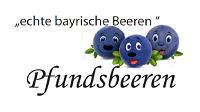"Blueberry cultivation in Bavaria is still quite manageable because the necessary soils for it do not actually exist and accordingly a lot has to be invested in soil preparation," says Andreas Kreuzmair, authorised signatory of Herbert Widmann GmbH. Together with him, we visited Pfundsbeeren GmbH, which grows blueberries on about 45 hectares and was founded seven years ago by the Riemensperger family and Herbert Widmann GmbH.
Clemens Riemensperger and Andreas Kreuzmair
Increasingly challenging weather
"Thunderstorms are becoming more and more frequent. We never had problems with drought in the past, which is why sprinkling was out of the question for us. Nowadays, it basically does not work without irrigation," says the Riemensperger family. "This year also started off extremely wet, followed by a drought and heat waves, from which the plants suffer a lot."
About 25 varieties are grown on the Riemensperger farm. "There are now varieties that tolerate machine picking better. The new varieties include Duke, Draper and Last Call. However, we can no longer grow older varieties such as the main standard variety Bluecrop. This is because they are more difficult to market to the trade due to their lack of durability, strength and mechanical stress." At present, he says, it is mainly varieties suitable for machine picking that are on the market. "This will probably increase in the future. Some of the old varieties are also still in cultivation, but they are gradually being replaced by the new ones."
Worldwide production plants
The idea for the cooperation came from Managing Director Dr Hans Widmann. "The Widmann company has had a production operation in Romania for almost 20 years. About ten years ago, we started to found and start up several in-house production companies in parallel. With Riemensperger, the first own-production company then started in Bavaria," says Kreuzmair. In recent years, South Africa, Namibia and Chile have also been added to cover all seasonal phases through in-house production. In northern Germany, the company buys in particular from Nordgemüse Krogmann GmbH & Co. KG, which is a subsidiary of Widmann GmbH.
High demand, little produce
When cultivation started in Bavaria, most of it was sold through direct marketing. "Consumption has changed, however. Our customers used to include corner shops and smaller fruit and vegetable shops," explains the Riemensperger family. The largest share is now marketed to food retailers, with smaller shares also going to the wholesale markets. "Consumers are looking for regional products," Kreuzmair knows. "As a result, we have little difficulty selling the goods, as both the food retailers and the wholesale market show great interest. It's just that there is too little produce at the moment."
The export potential would be very low in view of the high production costs and the competition from the respective domestic supply. With regional goods, it is still possible to achieve good sales in southern Germany anyway. "The domestic market takes the goods well." According to Kreuzmair, a large food retail chain has a two-pronged approach: "The larger units come from abroad, while smaller units come from German production. Consumers can decide for themselves which product they want. The same customer has also turned completely to German goods for the season.
Riemensperger recalls how blueberry production has developed so far: "In the past, blueberries were only available at certain times. Due to the high production rate worldwide, they are now available all year round. We are also currently in an unfavourable period for German blueberries. After all, goods from Romania, Serbia and Poland are on the market, but this will hit northern German producers in particular. We feel the competition quite clearly. However, the main problem for us is the increased minimum wage."
Production costs increased by 35 percent
The staff, such as workers from Romania and Poland, would have found a new incentive through the higher minimum wage. "The question is, however, to what extent we can still compete with imported goods in view of the high costs. Our production costs have risen by up to 35 percent compared to last year. In general, everything has become more expensive, for example, also harvesting costs, inputs, insurance, etc. Consumers also seem to have increasing financial hardships. We will find it difficult to exist with the given wages unless something changes."
Despite all this, the advantages of regional supply of goods were emphasized, which result from the short supply chain: "The goods are harvested in the morning, packed in the afternoon and the next day they are already in the shop. That's really the biggest advantage of regionality."
Further information: Familie Riemensperger
Familie Riemensperger
Pfundsbeeren GmbH
Ainertshofen 5
86570 Inchenhofen
Telephone: +49 176 17644181
E-Mail: info@pfundsbeeren.de
Web: www.pfundsbeeren.de
 Andreas Kreuzmair
Andreas Kreuzmair
Herbert Widmann GmbH
Schäftlarnstr. 10
81371 Munich
Telephone: +49 89 76 44 18
Telefax: +49 89 77 07 08
E-Mail: info@widmann-fruechte.de
Webseite: https://www.widmann-fruechte.de
